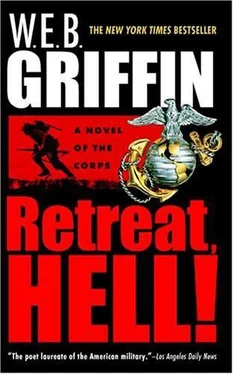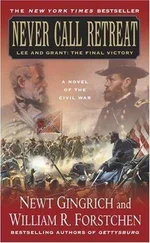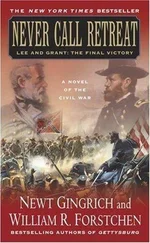"How did you know that?" he asked.
Howe winked at him.
"Well, Donald, let's have a look at these machines before the Supreme Commander gets here," Almond said.
[THREE]
As the staff car carrying Generals Almond and Howe started down the road beside the runway, McCoy paused long enough to wonder where they were going, then turned and motioned to Jeanette Priestly to get out of the Russian jeep.
He had given a lot of thought to Jeanette and to her relationship with Pickering.
Pick Pickering—a really legendary swordsman, of whom it was more or less honestly said he had two girls and often more in every port—had taken one look at Jeanette Priestly just over two months before and fallen in love with her.
And vice versa. The second time Jeanette—known as the "Ice Princess" among her peers in the press corps because no one, and many had tried, had ever been in her bed or pants—had seen him she had taken him to bed.
Everyone knew that "Love at First Sight" was bullshit, pure and simple, that what it really meant was "Lust at First Sight" and had everything to do with fucking and absolutely nothing to do with love.
Everybody knew that but Major Kenneth R. McCoy, USMCR. He knew there was such a thing as love at first sight because it had happened to him.
The first time he had seen Ernestine Sage he had known he would love her forever even though the chances of having her in his bed, without or with the sanction of holy matrimony, had ranged from zero to zilch, and he damned well knew it.
Ernie was from Pick's world. Her mother and Pick's mother had been roommates at college. Her father was chairman of the board of—and majority stockholder in—American Personal Pharmaceuticals. Everyone thought that Pick and Ernie would marry.
There was no room in Ernestine Sage's life for a poor Scotch-Irish kid from Norristown who had enlisted in the Marine Corps at seventeen, been a corporal with the 4th Marines in Shanghai, and was now a second lieutenant primarily because he had learned how to read and write two kinds of Chinese, Japanese, and even some Russian and the Marine Corps was short of people like that, and thus willing to commission them, temporarily, for wartime service.
A week after Ernie Sage had seen Second Lieutenant McCoy sitting on the penthouse railing of her parents' Fifth Avenue apartment overlooking Central Park, his feet dangling over the side, she had told her mother that she had met the man whose babies she wanted to bear and intended to marry him just as soon as she could get him to the altar, or some judge's chambers, whichever came first.
Pick, and Pick's father, thought that was a splendid idea. Everybody else, including Lieutenant McCoy, had thought it was insanity, that their marriage just wouldn't—couldn't—work.
But Ernie had known it was love, and could not be dissuaded, even though Ken had firmly declined the offer of her hand in wedded bliss. She had followed him around, proudly calling herself a camp follower, whenever and wherever he was in the United States during World War II.
She had written him every day, and when, toward the end of the war, he'd come home from a clandestine operation in the Gobi Desert a major on Presidential orders to attend the Army's Command and General Staff college, he was denied his final argument against their marriage—the very good chance that he either would not come home at all, or come home in a basket—she'd finally got him to the altar.
With conditions. He was a Marine, and wanted to stay a Marine. He would not take an entry-level executive training position with American Personal Pharmaceuticals—or with the Pacific & Far East Shipping Corporation—and she would not press him to do so. And they would live on his Marine pay, period.
There had been good times and bad in their marriage, but it had worked. The good times had included their year with the Army at C&GSC at Fort Leavenworth and a year at Quantico, which was close to Washington, so Ernie had a chance to see a lot of her parents. The Quantico assignment had ended when he had been reduced to captain, not because he'd done anything wrong, but because the Corps had shrunk and didn't need as many officers.
The Corps had a—maybe unwritten—policy that if you were reduced in grade, you were transferred, and that had seen them sent to Japan, where he had been a junior intelligence officer on the staff of the Commander, Naval Element, Supreme Headquarters, Allied Powers.
There, after a year or so, things had really gone wrong. He had come across what he believed to be compelling evidence that the North Koreans were going to invade the south. He'd worked long and hard to put it down on paper, and then turned it in to the Commander, Naval Element, Supreme Headquarters.
First, he got a "well done."
Then the Commander, Naval Element, Supreme Headquarters, called him back in and said, in effect, (1) "McCoy, you have never written an intelligence analysis of any kind regarding North Korean intentions, and certainly not one that had concluded 'war is inevitable,' " and (2) "Start packing. The Marine Corps has no further need of your services as a commissioned officer, and you will be separated from the Naval Service 1 July 1950. It will be determined later at what enlisted grade you may reenlist in the service if you desire to do so."
So far as Supreme Headquarters, Allied Powers, was concerned, McCoy's "war is coming" analysis no longer existed. Worse, it never had. All copies, McCoy was informed, had been destroyed.
McCoy found out why:
Major General Charles A. Willoughby, the Supreme Commander's intelligence officer, had just informed General MacArthur that there was absolutely no indication that the North Koreans had hostile intentions, and in any event their armed forces were incapable of doing anything more than causing mischief along the 38th Parallel. He did not want his judgment questioned by a lowly Marine captain.
When he had told Ernie he was getting the boot, Ernie had told him she wouldn't mind being a sergeant's wife.
He had realized then that it was his turn to make a few sacrifices.
What the hell, I might even like selling toothpaste and deodorant for American Personal Pharmaceuticals.
Once he had made that decision, there was one more decision to make, a big one. The Commander, Naval Element, Supreme Headquarters, Allied Powers, was wrong. All of the copies of McCoy's analysis had not been destroyed. He had his own copy of his analysis, his last draft before he had typed the whole thing over again before turning it in. He could not bring himself to either forget it or burn it.
After thinking hard and long, and fully aware that doing so could—probably would—see him facing a court-martial, he had given his draft copy of his analysis to Fleming Pickering.
Pickering was no longer a brigadier general and had no security clearance, and the Office of Strategic Services in which they had served in World War II no longer even existed. But he figured that Pickering could probably get the document into the hands of somebody who should have his information.
Whistling in the wind, he had told himself that the Corps might have a hard time court-martialing a civilian for the unlawful disclosure of a Top Secret document that wasn't supposed to ever have existed.
On his final, delay-en-route leave before reporting to Camp Pendleton for separation, he had been offered a civilian job he thought he might even really like, helping to develop an island off the coast of South Carolina as a retirement area.
It was the idea of Colonel Ed Banning, USMC, who was about to retire himself. Zimmerman, then stationed at Parris Island, had been enlisted in the project. He, like McCoy, had worked for Banning throughout World War II. As he and Ernie drove across the country to California, the idea of working with Colonel Banning and Ernie sounded like a hell of a better way than spending his life selling toothpaste and deodorant.
Читать дальше












